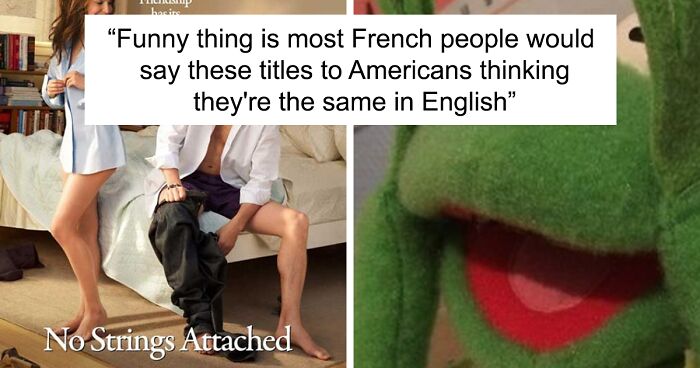
9 Hilarious Instances When French People ‘Translated’ English Movie Titles To English
You may remember the wonderful film Lost in Translation with the brilliant acting duo of Bill Murray and Scarlett Johansson. Personally, I have rewatched the movie about ten times over the past two-plus decades, and I’m going to repeat it one of these days. By the way, if I lived, for example, in Quebec, I would know this masterpiece by Sofia Coppola called Traduction infidèle, which can be translated from French as Unfaithful Translation.
Despite the fact that this title is not entirely authorial, it, by the way, even more accurately conveys the essence of the film, doesn’t it? But this is perhaps an exception – usually French film distributors ruthlessly edit the titles of Hollywood movies, wanting to please their audience. And this viral Twitter thread is about just that.
Twitter: juanbuis
Turns out, French film distributors often ‘rename’ English movie titles to please their audience
Image credits: juanbuis
It all started a few months ago when Twitter user @juanbuis shared an interesting discovery – it turns out that the popular ’00s comedy The Hangover was distributed in French cinemas under a title that can literally be translated back into English as The Very Bad Trip. By the way, this is also a rather successful find of translators, though the Original Poster (OP) became interested in this topic and started to explore French film distribution further.
Image credits: juanbuis
Image credits: juanbuis
Apparently, many Hollywood movies were shown in France with the word ‘Sex’ or ‘Sexy’ added to the titles
So, it turned out that, for example, the police comedy The Other Guys was shown in France as Very Bad Cops, while French viewers, it turns out, know Not Another Teen Movie as Sex Academy. What’s more, according to the original poster, French translators have a truly universal adaptation tool – just add the word “Sex” or “Sexy” in the title – and voila, you can release the film!
Image credits: juanbuis
Image credits: juanbuis
Don’t believe us? Okay, let’s check. The cute rom-com What’s Your Number is France’s Sex List, the slow movie A Short History Of Decay turned into the tempting Sex Therapy, and the mysterious thriller Tangled… well it turned out to be, right, Sex Trouble! One can only be surprised that the recently released horror comedy Cocaine Bear appeared in French cinemas not as Sexy Bear, but simply Crazy Bear.
Image credits: juanbuis
Image credits: juanbuis
It turns out, this tradition isn’t unique to French film distributors, but is pretty common worldwide
“Actually in any country, film distibutors often tailor the title to the audience – or how they see the audience, and that vision is not always right,” says Dmytro Kosygin, a film director and cameraman from Ukraine, whom Bored Panda asked for a comment. “Sometimes it’s because the language of the country in question doesn’t work with English puns. And sometimes the distributors are just trying to simplify things, or link them to another movie that was successful before.”
Image credits: juanbuis
Image credits: juanbuis
“For example, in the Ukrainian box office, the first film of the Fast And Furious franchise for some reason came out with the title Afterburner, so all the following English wording games and numbering of films passed by the viewer, because the distributors simply numbered the titles – and that’s all. But the movie The Hangover was shown in our cinemas under the title Bachelor Party In Vegas. But that’s not all. The Bridesmaids movie, which has no connections with The Hangover, was renamed to Bachelorette Party In Vegas, thus telling the audience what to expect from the movie.”
“I won’t say that this is a very successful practice, but each country has its own film distribution traditions, and cinema owners try to follow them. I don’t know how correct this is, but in this case, the viewer, as they say, votes with their money,” Dmytro states.
Image credits: zuppaiaia
Image credits: ArtPetio
Image credits: edukazak
Folks in the comments on Twitter were strongly divided on the topic and the heated discussion ensued
As for the commenters on Twitter, people’s opinions, as is often the case, are divided. English-speaking netizens consider this practice ridiculous, while the French, for example, reasonably note that English-language puns and idioms are not always clear or easy to pronounce in Romance languages. So adaptation for the local audience becomes absolutely necessary. It’s another matter how successful this adaptation is – but that’s a completely different matter…
Image credits: LeoDuffOff
Image credits: chrstnerode
Image credits: seb3point0
By the way, here’s another example for you. In the movie Hancock, any American can easily understand why Will Smith’s character chose this last name for himself. But foreigners, most likely, would need a long explanation about John Hancock and his signature under the US Constitution. That is why, in the dubbed version I saw, the hero simply admitted to seeing the name ‘John Hancock’ on another patient’s file at the hospital.
Image credits: ediggs
Image credits: timmolendijk
Image credits: Mrik
Image credits: LauraDonovanUA
Image credits: betty_nft
For now, before I go and review Lost In Translation, please feel free to share your opinions on whether you think the tradition to change original movie titles is ridiculous or not, and maybe recall some funny examples in the comments. After all, the more opinions, the more interesting, isn’t it?
53Kviews
Share on FacebookI hate that the movie "Mozart and the Whale" has the French title "Crazy in love"...
I had to Google the movie because I never had the occasion of seeing it (and probably thought it was another Crazy stupid love) and now I'm shocked because they used 'crazy' to talk about autist people loving each other and this is not OK.
Load More Replies...I'm Sri Lankan and once one of our TV channels decided to translate "Ratatouille" into "The Story of The Stupid Rat and The Boy". I don't know for what reason they decided to become so literal.
It's kind of funny, although the rat in question was clearly a genius. 😅
Load More Replies...let’s be honest, most of these films talk about sex, the French seem to be less afraid of the word than the Americans :D
There are about 332 million americans. We may be afraid of the word, but we definitely have no problem with the act.
Load More Replies...On a side note, we did not changed "Cars" to "Voiture" or "James Bond" to "Jacques Lier".
I prefer the French titles and movie posters to the English ones, except for Euro Trip. But the other French dubs actually tell you point blank the cusp of the movie and not this metaphorical, vague riddle that makes the movie sound dull. Just my opinion.
I'd imagine calling a movie "Euro Trip" doesn't sound that exciting when the audience is in Europe. They're like "What, you mean every time I go to work?"
Load More Replies...A lot of this is just a bunch of people from multiple countries being equally non-understanding and vaguely xenophobic. No, phrasal verbs are not easy nor standard, and yes countries other than france do this and america does this for foreign films as well. Translating is not the same as transliterating.
All these titles have nothing to do with either translation or transliteration. This practice is called localisation, meaning the company that bought screening rights for a certain country "thinks" the title is more suitable for the local audience and would sell the film more effectively. Happens (almost) everywhere. Same film in US and UK may have different titles, iMDb is full of them.
Load More Replies...The one commenter said "....French people just really want to watch movies about sex" but, if you think about it, most of those movies ARE about sex. The French just aren't being as coy about it as we are because they aren't so weirdly puritanical about that, IMO.
What I find bizarre is this: don't the French have a word for "hangover"? Or is that just not a condition the French acknowledge exists or that when hungover one can make terrible decisions? The original name was pretty self-explanatory if you understand hangovers.
The French have a phrase for hangover - "gueule de bois" Which, literarilly translated Is something like 'mouth of wood'.
Load More Replies...The French are straightforward, unlike the hypocrite Americans trying to hide a sex-themed movie with fancy titles
very bad trip isn't that far off of what the movie could have been about considering what happens in the movie
I hate that the movie "Mozart and the Whale" has the French title "Crazy in love"...
I had to Google the movie because I never had the occasion of seeing it (and probably thought it was another Crazy stupid love) and now I'm shocked because they used 'crazy' to talk about autist people loving each other and this is not OK.
Load More Replies...I'm Sri Lankan and once one of our TV channels decided to translate "Ratatouille" into "The Story of The Stupid Rat and The Boy". I don't know for what reason they decided to become so literal.
It's kind of funny, although the rat in question was clearly a genius. 😅
Load More Replies...let’s be honest, most of these films talk about sex, the French seem to be less afraid of the word than the Americans :D
There are about 332 million americans. We may be afraid of the word, but we definitely have no problem with the act.
Load More Replies...On a side note, we did not changed "Cars" to "Voiture" or "James Bond" to "Jacques Lier".
I prefer the French titles and movie posters to the English ones, except for Euro Trip. But the other French dubs actually tell you point blank the cusp of the movie and not this metaphorical, vague riddle that makes the movie sound dull. Just my opinion.
I'd imagine calling a movie "Euro Trip" doesn't sound that exciting when the audience is in Europe. They're like "What, you mean every time I go to work?"
Load More Replies...A lot of this is just a bunch of people from multiple countries being equally non-understanding and vaguely xenophobic. No, phrasal verbs are not easy nor standard, and yes countries other than france do this and america does this for foreign films as well. Translating is not the same as transliterating.
All these titles have nothing to do with either translation or transliteration. This practice is called localisation, meaning the company that bought screening rights for a certain country "thinks" the title is more suitable for the local audience and would sell the film more effectively. Happens (almost) everywhere. Same film in US and UK may have different titles, iMDb is full of them.
Load More Replies...The one commenter said "....French people just really want to watch movies about sex" but, if you think about it, most of those movies ARE about sex. The French just aren't being as coy about it as we are because they aren't so weirdly puritanical about that, IMO.
What I find bizarre is this: don't the French have a word for "hangover"? Or is that just not a condition the French acknowledge exists or that when hungover one can make terrible decisions? The original name was pretty self-explanatory if you understand hangovers.
The French have a phrase for hangover - "gueule de bois" Which, literarilly translated Is something like 'mouth of wood'.
Load More Replies...The French are straightforward, unlike the hypocrite Americans trying to hide a sex-themed movie with fancy titles
very bad trip isn't that far off of what the movie could have been about considering what happens in the movie

 Dark Mode
Dark Mode 

 No fees, cancel anytime
No fees, cancel anytime 


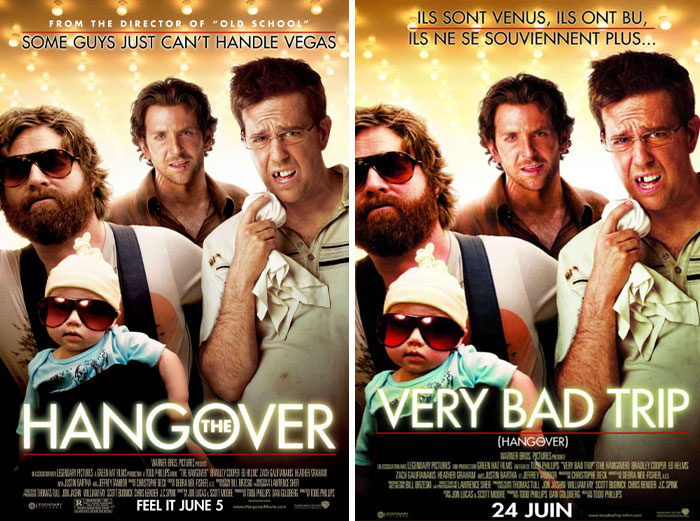
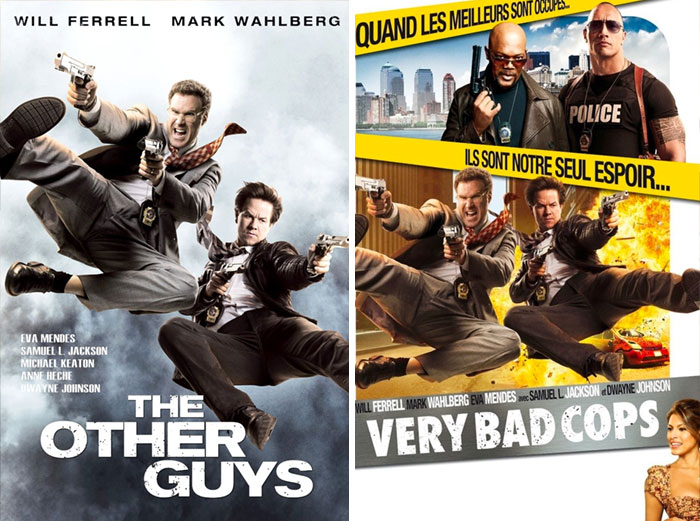
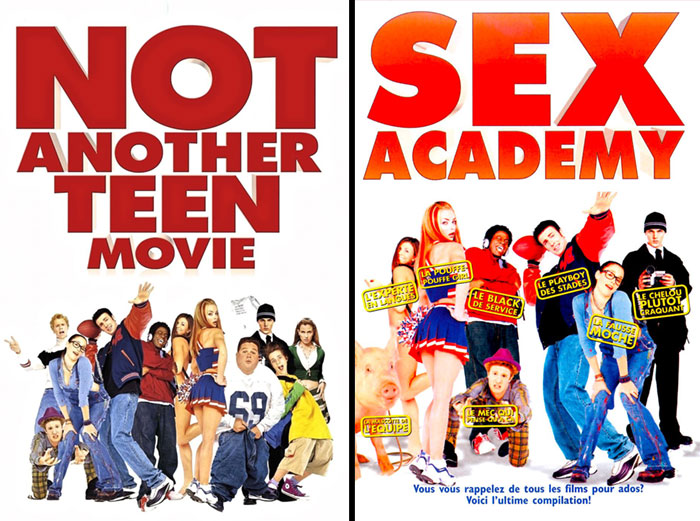
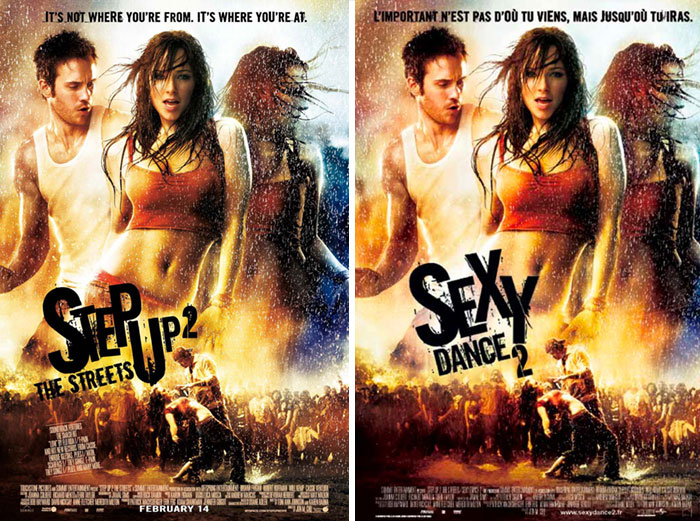
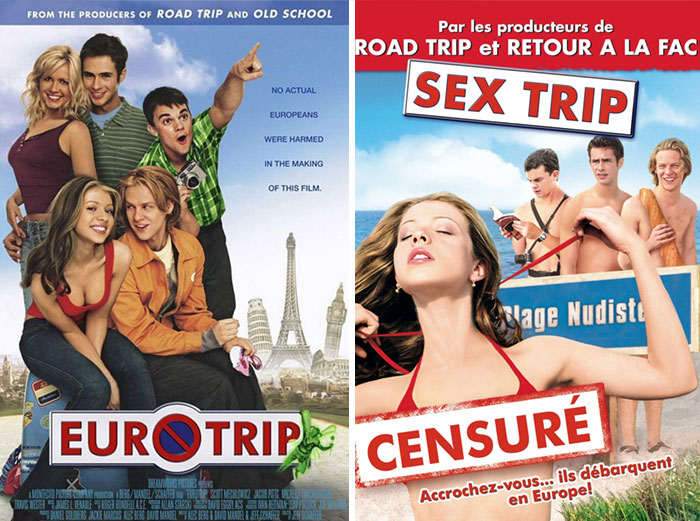
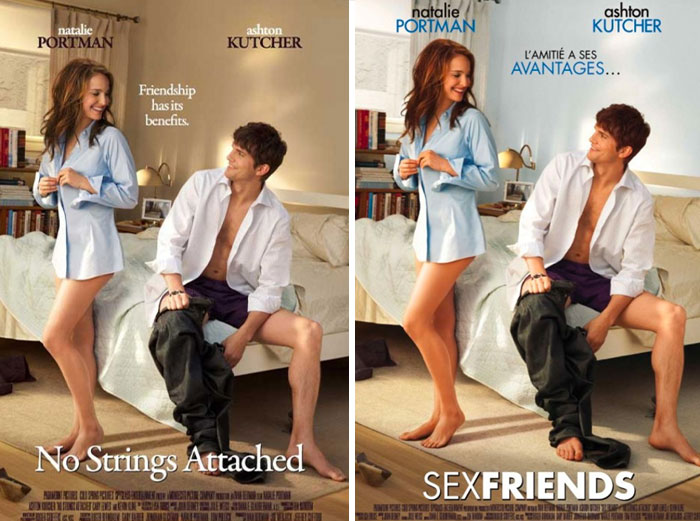
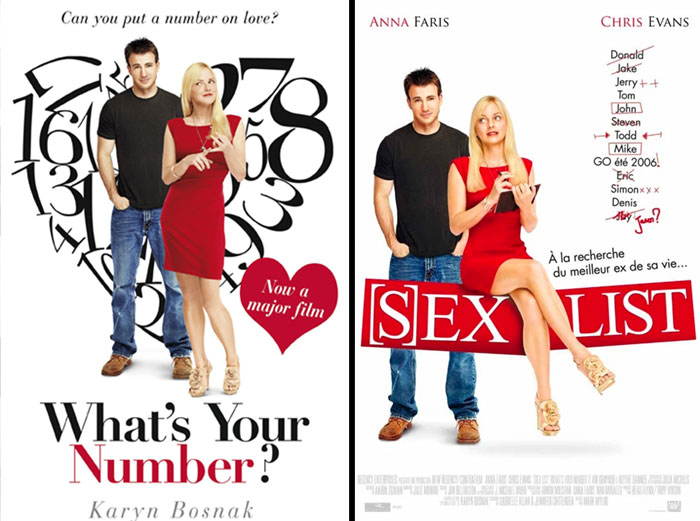
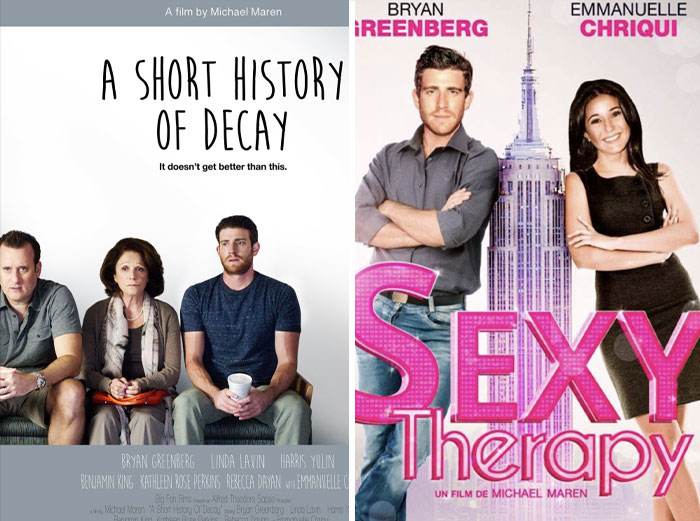
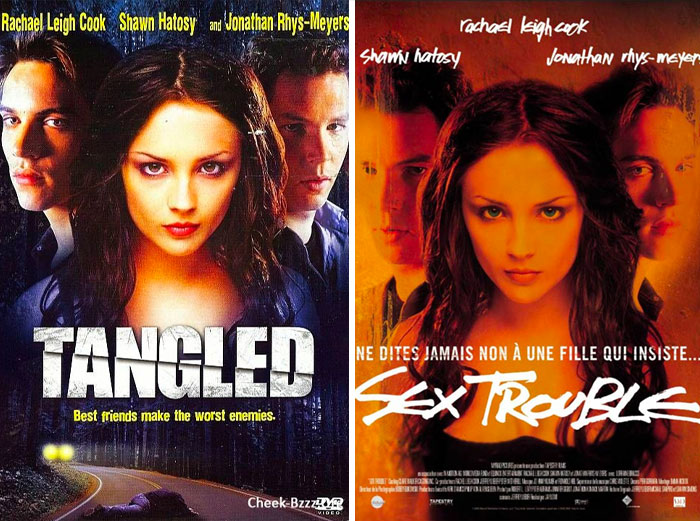
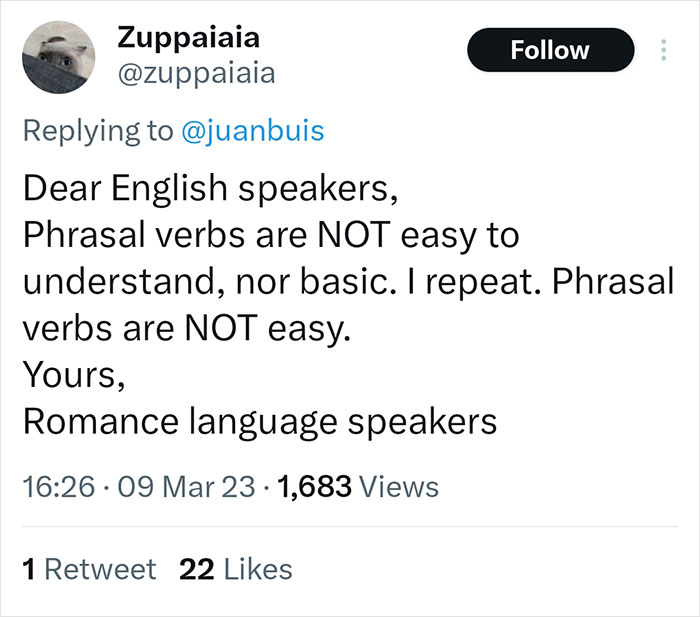
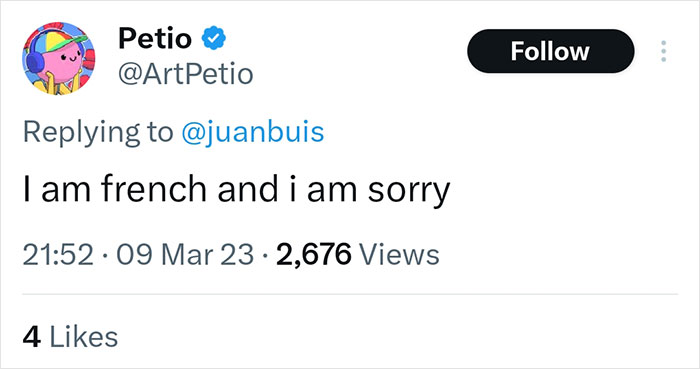
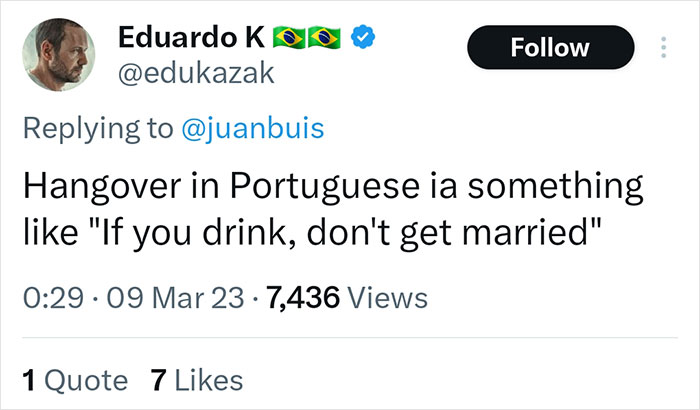
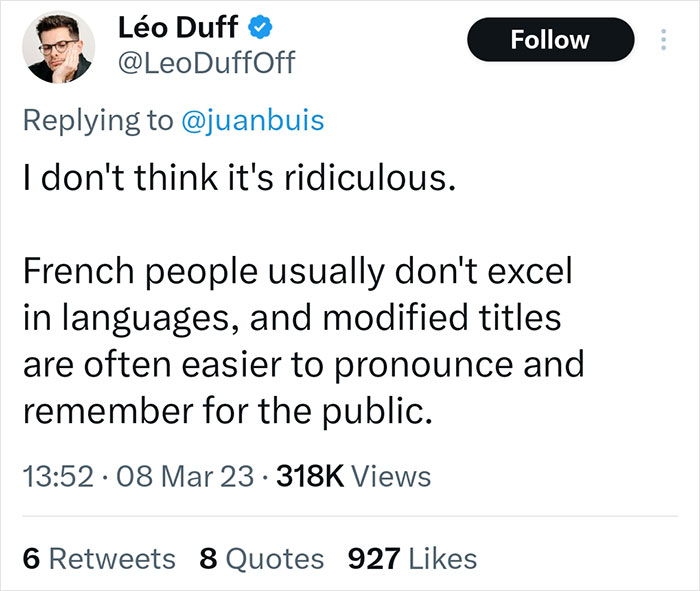
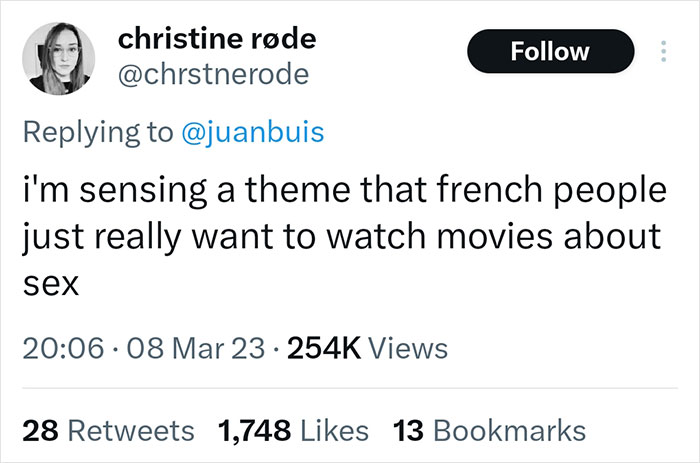
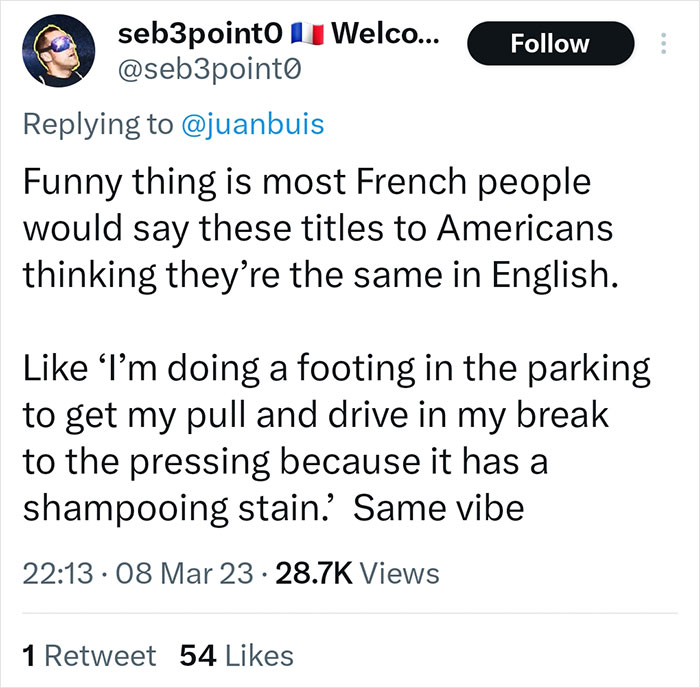
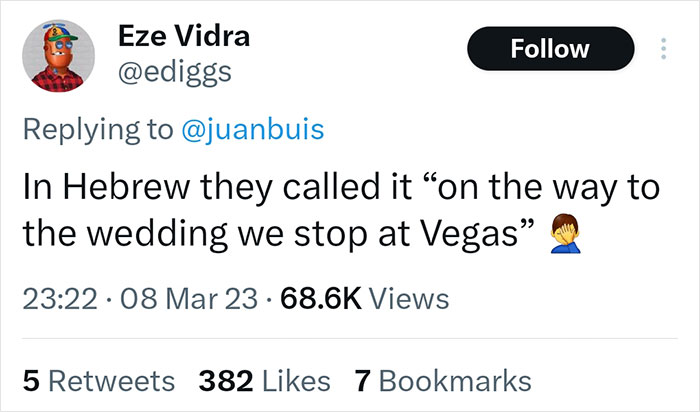
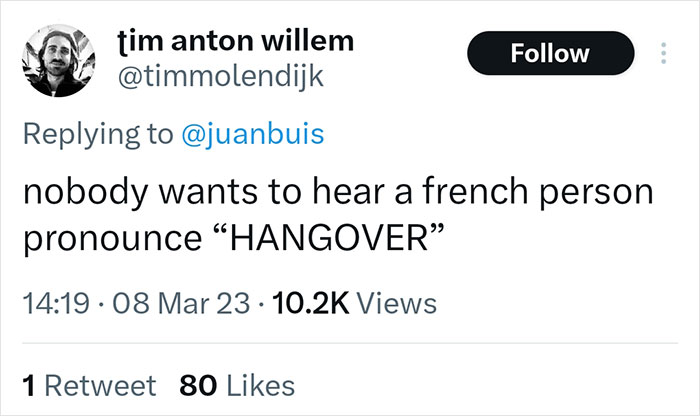
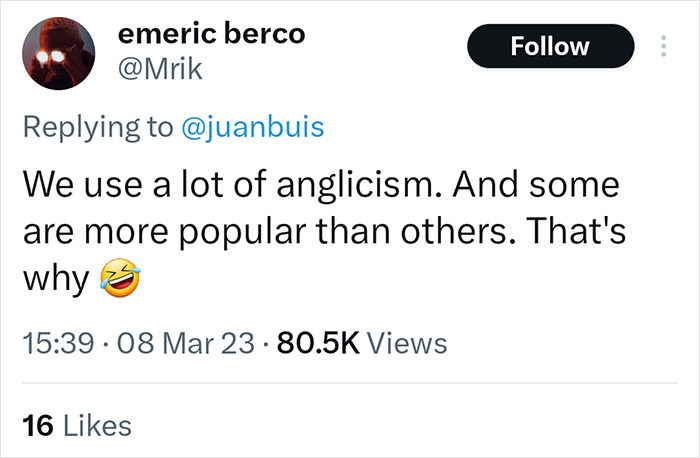
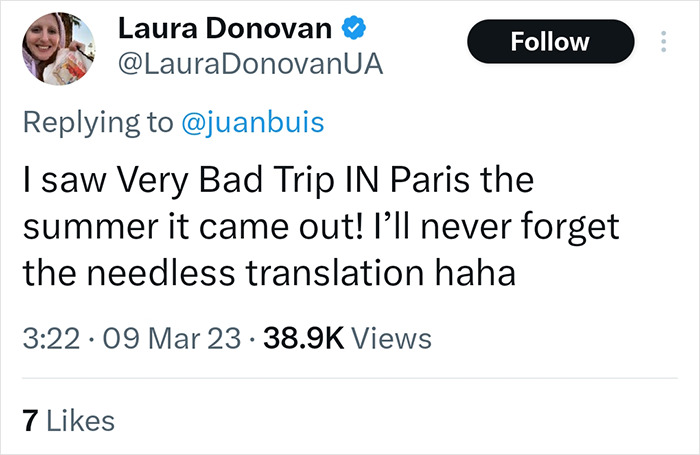
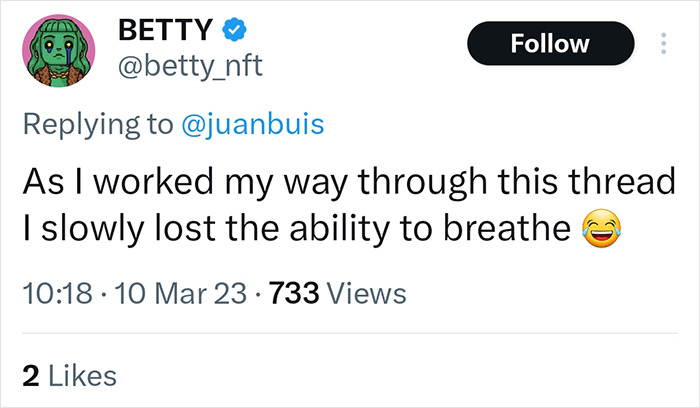












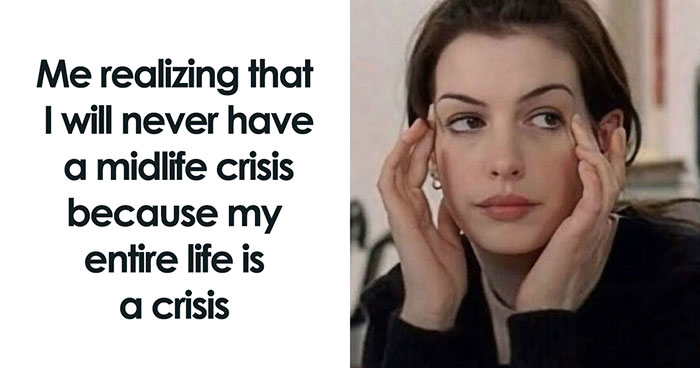































102
50